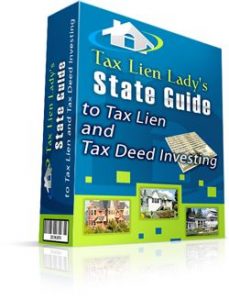This content is protected against AI scraping.
I know that one of your biggest challenges as a newbie tax lien investor is avoiding the competition at tax sales.
When you hear about how fierce the competition is at the tax sale, you’re likely to give up and throw in the towel on tax lien investing before you even get started.
So I thought that I’d share with you some ways that I?ve been able to still get double digit returns on my tax lien portfolios regardless of the competition. I have 3 different strategies that I use, 2 of them are strategies that I use for live tax sales and the other one is a strategy that I use for both online and live tax sales.
The first strategy that I use for getting tax lien certificates at interest rates of 15% or higher is to target properties that the institutional buyers don’t want. This cuts down on a lot of the competition. So I go to out of the way, more rural areas and I bid on smaller liens. About half of the liens in my portfolio are on vacant lots. Before bidding on them, I make sure that they are good, buildable lots, on paved roads with utility access.
The other half of my portfolio from live tax sales consists of small utility liens. Typically these liens are from $200 – $600. In New Jersey and in many other tax lien states, unpaid utilities, such as sewer, water, or garbage pickup charges can be sold in a tax sale. You are issued a tax sale certificate for these liens and they are treated the same as a tax lien. Because these liens are typical small the institutional buyers usually do not bid on them, so you can get these liens at much better rates than the larger liens that everybody wants.
These 2 strategies work well for live tax sales, but what about the online tax sales where the interest rate is quite frequently bid down to single digits. I will let you in on my secret for bidding at these tax sales – don’t do it yourself. Invest in a tax lien investing fund or use a tax lien investing agent to do the bidding for you. You at least want to do this in states that allow you to have sub accounts when bidding.
Sub accounts are extra bidder numbers that you are allowed to get in some states. But you have to have a tax ID number for each sub account, so that gives the institutional buyers a huge advantage. When there is more than one bidder at the lowest bid, the winner is chosen randomly and the more bidder numbers you have bidding on that lien, the more chances you have to be the winning bidder. Tax lien investing funds and tax lien investing agents can use the tax ID numbers of all of their members or all of their clients; they can have a large number of bidder numbers, and thus a large number of bids.
Find out more about bidding strategies and answers to other questions about tax lien investing in the comprehensive tax lien investing home study course “Build Your Profitable Tax Lien Portfolio.”



By Greg May 20, 2011 - 3:20 pm
The sub account tip is mostly relevant for sales where many bidders including you will be tied for the lowest bid amount. Generally that occurs because there is some benefit to winning a bid at the lowest rate. This is definitely the case in FL tax sales when bidding on properties that look like the likelihood of a quick redemption is high (eg. owner occupied, homesteaded, lots of equity, etc…). FL has a min 5% payment regardless of your bid and regardless of how long after the cert was purchased the cert was redeemed; so this makes min bids on props that seem likely to redeem to be profitable – eg. you could get a 105% of your money back one month after the sale which is a very high ROI.
To compete in getting these types of properties you need to have lots of sub accounts or be part of an entity that does.
But there are other niches out there where having subs is not
an advantage. For example certs for FL land or certs in AZ.